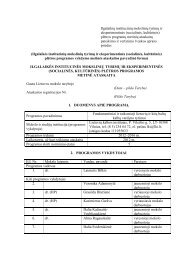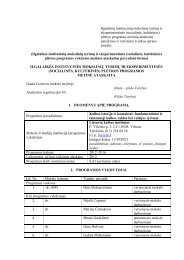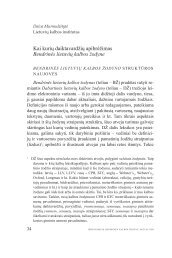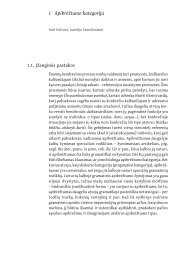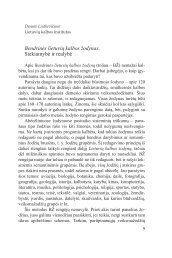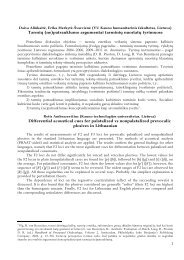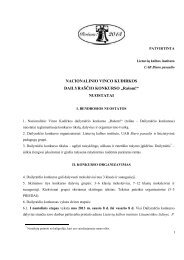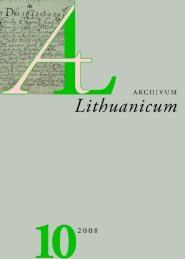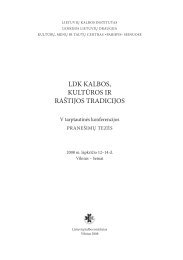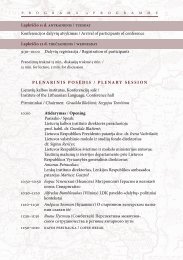archivum lithuanicum 2 (4,26 mb) - Lietuvių kalbos institutas
archivum lithuanicum 2 (4,26 mb) - Lietuvių kalbos institutas
archivum lithuanicum 2 (4,26 mb) - Lietuvių kalbos institutas
You also want an ePaper? Increase the reach of your titles
YUMPU automatically turns print PDFs into web optimized ePapers that Google loves.
eplace the official Slavic (Russian or Belorussian) language in the legal system of<br />
the Grand Duchy of Lithuania, in clerical work and in the chancellery of the king.<br />
Rotundas maintains that Latin is the native and primary language of the Lithuanians<br />
and that there is a tradition of legal Latin. (Curiously enough the legend of<br />
the Roman origin of the Lithuanians still persists. Recently a local artist of considerable<br />
repute, who spends part of the year in Paris, told me that he had known<br />
Lithuanians in Paris and that the Lithuanians were originally Romans. Unfortunately<br />
our group was just breaking up at this moment and I did not have the chance<br />
to inform him otherwise.) Naturally Ulèinaitë also discusses Maþvydas’ letters,<br />
which give us a picture of his living conditions. She concludes (p. 232) that “[...] in<br />
16th century Lithuania the forms of the epistolary genre were known, fostered and<br />
supplemented by actual European and Lithuanian realia.”<br />
“Book publishing activities of the Prussian authorities in the 16th-18th centuries”<br />
(pp. 235-<strong>26</strong>5) is the title of the article by Domas Kaunas who discusses (1) the<br />
organization and funding of book publishing, (2) remuneration for authors, (3) the<br />
size of the various editions and (4) censorship. The publication of Maþvydas’<br />
Catechism and the Old Prussian catechisms by Hans Weinreich in Königsberg was<br />
funded by the state. The printers were paid two marks and three shillings for the<br />
first Old Prussian catechism and only two marks for the second corrected edition<br />
(p. 236). The publication of Maþvydas’ second book, Giesmë ð. A<strong>mb</strong>razeijaus bei ð.<br />
Augustina (The Hymn of St. A<strong>mb</strong>rose and St. Augustine, 1549) was, however, apparently<br />
financed by Sebastian Perbanth, the commander of Ragnit (p. 237). According<br />
to Kaunas (p. 246) in the dedication of Vilentas’ Euangelijos bei epistolos (1579)<br />
the latter mentions that the translation was approved by experts in theology and<br />
the Lithuanian language. Thus we can assume that authors of the works published<br />
in early Lithuania submitted their works to others before publication (p. 247). Later<br />
for the 17th century there is documentary evidence of the appointment of experts<br />
to study the manuscripts of proposed publications (p. 249). Thus a group of seven<br />
experts in the Lithuanian language was appointed to evaluate “The Psalms of<br />
David” prepared by Johann Rhesa (1625). A board of editors was appointed to<br />
evaluate Daniel Klein’s grammar and hymn book which were then discussed at<br />
informal meetings at Klein’s home in Tilsit.<br />
We know that Maþvydas received 70 marks annually for his work in Ragnit and<br />
this amount was sufficient to buy 350 kg of butter, 150 kg of good wool, 140 sheep<br />
and two good or eight old horses (p. 254). Although Vilentas’ royalties were at first<br />
rather modest, later having worked on the translation of the Euangelijos bei epistolos<br />
initially received 70 marks and from 1563 on 90 marks. Of course, as Kaunas<br />
remarks: “[...] it was the moral remuneration—the opportunity to realize creative<br />
potential, and public recognition of the intellectual part of society—that was most<br />
significant to many an author of the feudal epoch” (p. 256). In this sentence the of<br />
is rather tricky. It is not immediately clear whether the authors get public recognition<br />
from the “intellectual part of society” or whether the public is giving recogni-<br />
222 Archivum Lithuanicum 2




